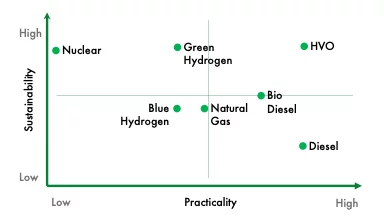In recent years, there has been an increased focus on data centre sustainability. While the sourcing of renewable power has been at the forefront, all aspects of data centre operations are being scrutinised.
In this article I look at alternatives for data centre standby power generation and in particular the use of Hydrogenated Vegetable Oil (HVO) as a practical, sustainable fuel source.
Traditionally, diesel has been the most common fuel source for standby power generation. It is readily available in almost all regions of the world and cost effective. But it’s carbon intensive and produces significant pollution.HVO is emerging as a green and sustainable alternative to traditional fuels. It’s a type of renewable diesel produced from waste vegetable oils and animal fats. Unlike conventional biodiesel, HVO goes through a hydrogenation process, which removes impurities, enhances its performance, and reduces its environmental impact.
HVO is a renewable source of energy, produced from waste and residues. This means it doesn’t rely on finite resources, making it a sustainable choice for long-term use.
It has excellent cold properties and high cetane numbers, which means it performs well in a range of climates and has a high ignition quality.
HVO has a lower environmental impact compared to both conventional diesel and biodiesel. It emits less greenhouse gas and particulates than diesel and is sourced through recycling existing waste products, contributing to cleaner air, healthier environments and reducing the drain on natural resources that biodiesel encourages.

Uptime is of paramount importance to data centre operators. So, ensuring continuous power availability in the event of a grid power outage is critical. Typically, this is managed with the onsite provision of multiple diesel generators, large storage tanks and multiple sources of fuel supply so that power can be sustained in the case of a prolonged outage.
HVO can be used in diesel engines without any modifications, making it a convenient alternative fuel. It’s also compatible with existing fuel infrastructure, which means it can be easily integrated into current systems. The only impact is to fuel storage that requires an additional 5-10% of capacity.
HVO is readily available in Southeast Asia, but not from multiple sources as with diesel. As HVO can be used interchangeably with diesel there is no risk to operations therefore establishing HVO as a highly practical alternative,
Finally, HVO is highly stable. Unlike biodiesel, it doesn’t degrade over time, making it suitable for long-term storage. This is particularly advantageous for data centres, which require a reliable power backup solution that can be stored for extended periods. It is also odourless has 50% less particulate production and produces 50% less smoke.
In some markets green hydrogen fuel cells are providing a useful alternative to diesel generation. Hydrogen is the lightest and most abundant element in the world, which makes it a strong candidate for a sustainable renewable energy source. The costs to transport and store it, as well as produce “green hydrogen” through the process of electrolysis, have kept it from reaching widespread adoption and it is not currently available in Southeast Asia.
In the future, nuclear energy has potential for providing continuous clean energy for large data centres and campuses, but it is not ready for general use and there are widespread public concerns about its safety.
At Evolution Data Centres we will strive to use available, sustainable and practicable fuels for our standby power requirements. Our approach ensures that we deliver reliable power sustainably with tried and tested generation technology.